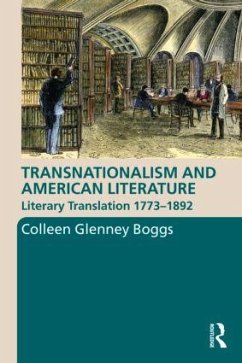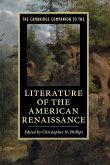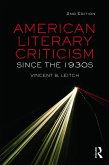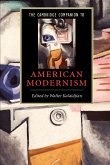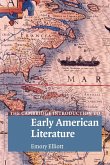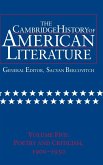What is transnationalism and how does it affect American literature?
This book examines nineteenth century contexts of transnationalism, translation and American literature. The discussion of transnationalism largely revolves around the question of what role nationalism plays in the spaces and temporalities of the transatlantic. Boggs demonstrates that the assumption that American literature has become transnational only recently - that there is such a thing as an "era" of transnationalism - marks a blindness to the intrinsic transatlanticism of American literature.
This book examines nineteenth century contexts of transnationalism, translation and American literature. The discussion of transnationalism largely revolves around the question of what role nationalism plays in the spaces and temporalities of the transatlantic. Boggs demonstrates that the assumption that American literature has become transnational only recently - that there is such a thing as an "era" of transnationalism - marks a blindness to the intrinsic transatlanticism of American literature.
'A major contribution to the new, postnational American Studies: sophisticated and original.' - Dr. Jess Edwards, Manchester Metropolitan University, UK
'In this book, Colleen Glenney Boggs makes a startlingly powerful and original case...While other critics consider transnationalism primarily as a spatial or political phenomenon, Glenney Boggs focuses our attention on evidence of linguistic variety in the pages of American works themselves: a significant angle so far overlooked by those who habitually equate national print culture with monolingualism. She persuasively argues that American texts have always been multilingual and that 'the practice of linguistic translation' actually helped rather than hindered American authors in their quest for artistic innovation.' - Leslie Eckel, "The Comparatist"
'Colleen Boggs wastes no words; every page provokes reflection and re-pays re-reading... This is critical comparison at its best: compact, challenging and illuminating.' - Susam Manning, Edinburgh University
'In this book, Colleen Glenney Boggs makes a startlingly powerful and original case...While other critics consider transnationalism primarily as a spatial or political phenomenon, Glenney Boggs focuses our attention on evidence of linguistic variety in the pages of American works themselves: a significant angle so far overlooked by those who habitually equate national print culture with monolingualism. She persuasively argues that American texts have always been multilingual and that 'the practice of linguistic translation' actually helped rather than hindered American authors in their quest for artistic innovation.' - Leslie Eckel, "The Comparatist"
'Colleen Boggs wastes no words; every page provokes reflection and re-pays re-reading... This is critical comparison at its best: compact, challenging and illuminating.' - Susam Manning, Edinburgh University
'A major contribution to the new, postnational American Studies: sophisticated and original.' - Dr. Jess Edwards, Manchester Metropolitan University, UK
'In this book, Colleen Glenney Boggs makes a startlingly powerful and original case...While other critics consider transnationalism primarily as a spatial or political phenomenon, Glenney Boggs focuses our attention on evidence of linguistic variety in the pages of American works themselves: a significant angle so far overlooked by those who habitually equate national print culture with monolingualism. She persuasively argues that American texts have always been multilingual and that 'the practice of linguistic translation' actually helped rather than hindered American authors in their quest for artistic innovation.' - Leslie Eckel, "The Comparatist"
'Colleen Boggs wastes no words; every page provokes reflection and re-pays re-reading... This is critical comparison at its best: compact, challenging and illuminating.' - Susam Manning, Edinburgh University
'In this book, Colleen Glenney Boggs makes a startlingly powerful and original case...While other critics consider transnationalism primarily as a spatial or political phenomenon, Glenney Boggs focuses our attention on evidence of linguistic variety in the pages of American works themselves: a significant angle so far overlooked by those who habitually equate national print culture with monolingualism. She persuasively argues that American texts have always been multilingual and that 'the practice of linguistic translation' actually helped rather than hindered American authors in their quest for artistic innovation.' - Leslie Eckel, "The Comparatist"
'Colleen Boggs wastes no words; every page provokes reflection and re-pays re-reading... This is critical comparison at its best: compact, challenging and illuminating.' - Susam Manning, Edinburgh University

